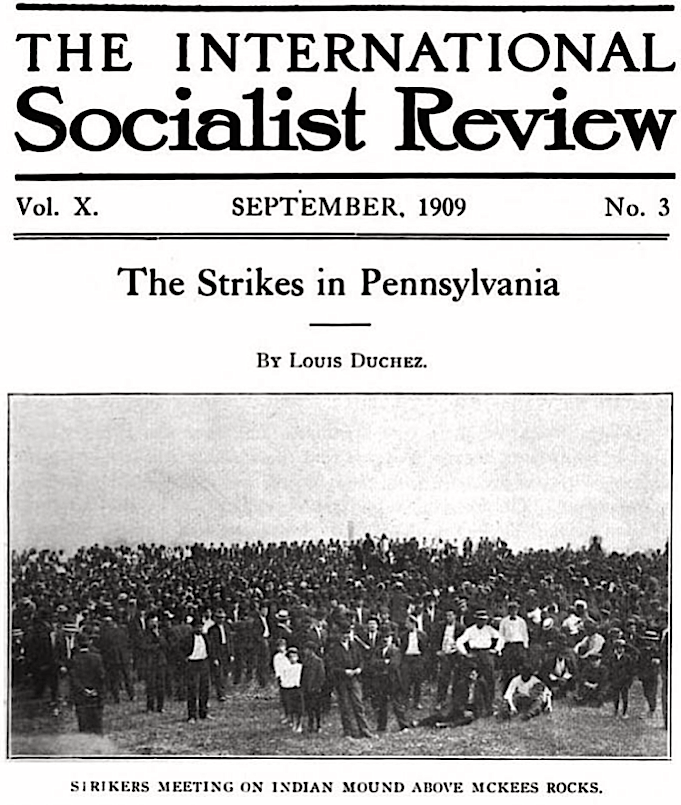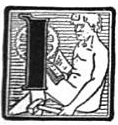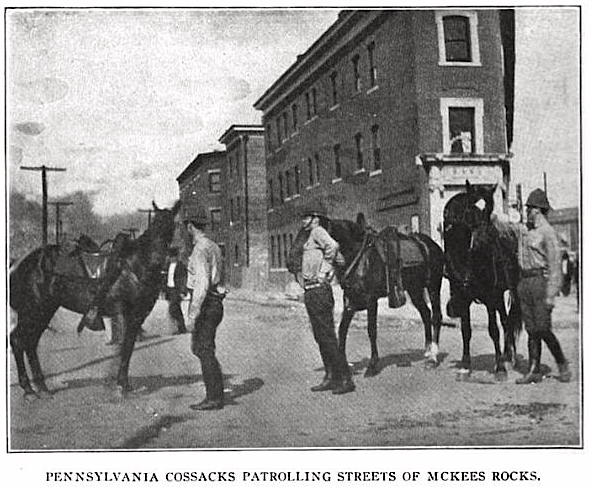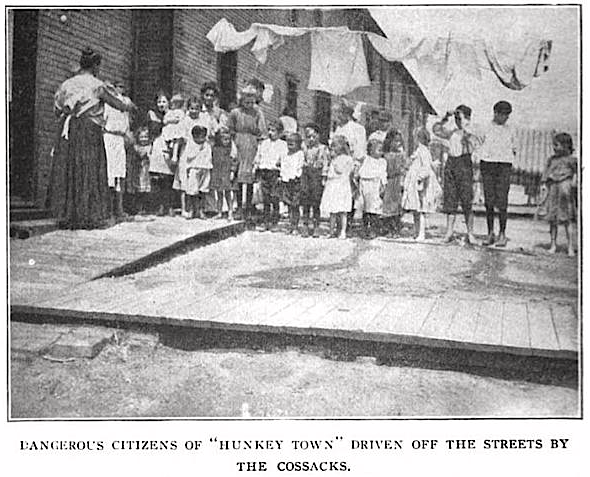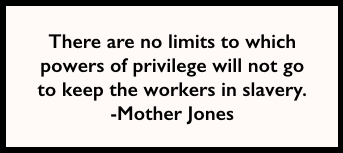 ———-
———-
Hellraisers Journal – Friday September 3, 1909
“The Strikes in Pennsylvania” by Louis Duchez, Part I
From the International Socialist Review of September 1909:
T is impossible to treat this subject fully within the space allowed. The writer will simply present a few of the more important facts gleaned from a study of conditions as they exist at McKees Rocks, Butler and New Castle.
At McKees Rocks fifty riveters of the “erection department” of the Pressed Steel Car Company’s plant came out on strike. The others remained at work. Half of those fifty returned the next day—the other half were discharged. The following day one-third of the force in the “passenger car department” walked out and they returned to work twenty-four hours later. About half of those were “fired.” On the third day half of the force of the “Pennsylvania porch department” walked out.
The discharged men with the new strikers organized their forces at once and placed pickets at the entrances of the mills, and within four hours had all workers out, with the exception of those employed in the “crane and tool department,” and those in the power houses. Most of the men in the crane and tool department were organized in the A. F. of L., Local Union No. 124, International Association of Machinists. They remained at work as long as it was possible for them to do so. When the other departments were tied up they had to come out.
Five thousand men are involved in the McKees Rocks strike; those dependent on them number 20,000. At this writing, there are wounded in riots, 78; dangerously hurt, 6; deputy sheriffs on guard, 200; state constabulary on duty, two troops. There were fifty men wounded on Wednesday, July 15th.
The reasons for the strike are many and one. As a matter of fact the oppression became so great that the workers could stand it no longer. The few riveters simply started the ball rolling. The others were waiting. They had no organization. They were nearly all foreigners, principally Germans, Hungarians and Poles. The principal source of the strikers’ discontent and oppression is what is called the Baldwin contract or “pooling” system. In brief, it is the parceling out of lots of work to a foreman who contracts do it for a certain sum, the money to be divided prorata among the men under him. This system has been very satisfactory to the company, and the president, Frank N. Hoffstot, says: “We will not change the pooling system, against which, it is said, the men complain. In fact, we intend to increase it, and extend it to all departments.”
President Hoffstot says it has proven to be a very satisfactory arrangement. And it has—to the company. As evidence of this we saw several pay envelopes showing that many of the workers slave for practically nothing. One envelope showed that the owner worked nine days, ten hours a day, and got $2.75; another eleven days and received $3.75; another three days and got $1.75; another four days and got $1, and the fifth, who had been idle for two months, worked three days and received nothing. “A very satisfactory arrangement,” indeed. The company manages the pooling system through the foreman — and the workers are skinned until their bones shine.
Most of them are compelled to purchase their jobs. Some of the foreigners have paid as high as twenty and twenty-five dollars for a chance to work, and afterwards they have had collected from their pay by clerks, who go among the men, 10 and 15 per cent every two weeks.
The company owns the houses, “shacks” holding six families, and they are rented for $12 a month. If boarders are kept, extra charges are made. In several instances families that kept one boarder were charged $12 a month extra. In another case one family that boarded three men, with only four rooms in their house, paid rent amounting to $24 every two weeks, and this was collected from the wages of the boarders.
Two years ago, before the pooling system was introduced, the men were making $3, $4 and $5 a day. Today most of them make 50 and 75 cents and $1 a day. The company owns the stores. Every thing must be bought there or the employee soon loses his job. By keeping the slaves struggling from hand to mouth they have been held in submission until this revolt came a few weeks ago.
In Butler the conditions are practically the same as in McKees Rocks. The Standard Steel Car Company, another branch of the steel trust, has been forcing the same conditions on the workers there. The Butler men were not given as much publicity-that’s all. Six families are jammed together in tiny houses—or pig pens—and they pay $8 out of their wages every two weeks for them. The men in the mill average about $15 a pay, so over half of their earnings goes for rent alone. The men and their families are kept in abject slavery. “Kickers” are fired and evicted from their houses and in many cases they are given no pay whatever after they have worked hard for two weeks—the steel trust says they don’t deserve it. One man in Butler, who had the nerve to put by $150, and made a payment on a little shack outside the company’s territory, was discharged at once and all those who expressed sympathy with him or were seen at his house were “spotted” by the company “bulls.” Above all things the worker who was known to talk unionism was “chopped off.”
There were over 3,000 out on strike in Butler. As at McKees Rocks, six riveters came out and the rest followed. It was simultaneous with the walk-out at McKees Rocks. The workers there are nearly all Poles, Greeks, Hungarians and Russians. They were not organized, either.
In New Castle it is different. The strike was against the “open shop” order of the American Sheet and Tin Plate Company. About half the men were organized in the Amalgamated Association and the Tin Workers’ Protective Association, though only about 30 per cent of the members were paid up in dues a week or so before the strike. There are about 3,300 men involved in the New Castle strike. In New Castle with the kick against the “open shop” order they are also resisting a reduction in the wages of the “hot mill” men—those who work about the heaters.
The methods used to stamp out the spirit of revolt and incite riot in McKees Rocks, Butler and New Castle have been the most brutal and bare-faced ever used in the history of labor troubles in the United States, I believe. “Law and order” was pushed aside entirely. Not only that but those who stood for “law and order” did everything and avoided nothing that would press into greater and greater slavery the working class of Pennsylvania.
In McKees Rocks the slave condition of the workers was given much publicity. The Pittsburg Leader (for political reasons) came out openly and told of the steel car company’s methods and the brutality of the company “bulls” and the “Pennsylvania Cossacks.” The stories are almost unbelievable—the despotism was greater than that of Russia—but they were true.
In the mills the men were worked until they dropped with over exhaustion. When a man was killed he was left to lie in the “bull pen”—an open space where the dead and injured are hurried—until the close of the day in many cases. His friends were not permitted to quit work to take him home—if they did they would be told to go to the office and get their “time.” The average death in the plant of the Pressed Steel Car Company was one man a day. The company had a system of insurance in which so much was collected from the men. When one was killed more were waiting out at the gate ready to take his place. The steel trust lost nothing.
[The Slaughter House]
The plant of the Pressed Steel Car Company is known as “the slaughter house,” and “the last chance,” because of the many accidents, and the fact that those who work there can get work nowhere else. The Pittsburg Leader of July 15th says:
The lowest wages, the worst working conditions, the most brutal treatment, looking to the deadening of every human impulse and instinct, graft, robbery and even worse, the swapping of human souls, the souls of women, for the lives of their babes, have for years marked the Pressed Steel Car Works as the most outrageous of all the outrageous plants in the United States. The “slaughter house” is the most expressive name that could be given to the plant, although it has other claims to rank as a strong side show of Inferno.
Workingmen are slaughtered every day, not killed, but slaughtered. Their very deaths are unknown to all save the workers who see their bodies hacked and butchered by the relentless machinery and death traps which fill the big works. Their families, of course, know that the bread stops coming. But the public, the coroner, everybody else, is ignorant of the hundreds of deaths by slaughter which form the unwritten records of the Pressed Steel Car Plant. These deaths are never reported. They are unknown by name except to their families and their intimates. To others they are known as “No. 999” or some other, furnished on a check by the “slaughter house” company for the convenience of its paymasters. A human life is worth less than a rivet. Rivets cost money.
A woman representative of the Leader writes:
I spent several hours in the dwelling places—for they cannot be called homes—of these workmen yesterday. They are all alike both without and within. Situated in what is known as the Dump of Schoenville, runs a narrow dirt road. Frequently strewn with tin cans and debris, it is bereft of trees and the glaring sun shines pitilessly down on hundreds of ragged, unkempt and poorly fed children.
They seem too young to leave their mothers’ sides, but in spite of their youth, their faces, wan, white, and surmounted by the blonde hair of their Slavonic nationality, are peculiarly aged in their expression, and their eyes gleam with premature knowledge, which is the result of a daily struggle, not for life, but for existence. These are the children of “the company’s men.” Their fathers are always spoken of as “the company’s men.” They refer to themselves that way, for the long oppression and constant bullying at the hands of petty bosses have forced them practically to consider themselves as slaves.
I quote again from the same capitalist sheet. This is an editorial:
Skilled men with their faces begrimed and hands made horny by wielding the weapons used in the industrial battle for an existence come from the shops of this great car company and say they have been paid 10 to 12 cents an hour for their labor. They point to Schoenville, derisively called “Hunkerville” by the bosses, where there are long rows of squalid houses, the homes of an army of foreigners and ask whether these men with their families are living as human beings or animals. They point within the homes of Poverty Row to the bare floors, the empty larders and hungry children and ask why, if “the laborer is worthy of his hire” these men who journeyed from foreign shores to what they thought was the land of promise, are compelled to live in such poverty and misery.
And these are the men who are striking. They have no organized union, but as one man they present their cause.
Foreigners have been encouraged to seek employment with this company. A big percentage of the men in the car works are foreign born. A glance at their homes and a survey of their lives leads to the conviction that they have been reduced to the state of animals.
But these foreigners are men, with hearts that throb and arms ready to protect their wives and children. Their babes are just as dear to them as the children that nestle in silken pillows are to wealthy parents. Poverty and adversity have been strong bonds of sympathy and affection between these men and their wives.
That is the reason these wives fight for “their men.”
The foreigners labor under men speaking a strange tongue. The “pooling” and intricate pay systems of the strangers are beyond the comprehension of the foreign-born toilers.
But they do know some things. They know when their families are hungry and naked. They know when the pay envelope is exhausted before the larder is filled with simple food and the children are provided with shoes. They see that there is work to be done. They do not understand why in the doing of that work a man cannot earn a livelihood. Nor do they understand why the “land of promise” sends armed men to shoot them down when they object to strangers taking their jobs. And so they fight.
I have quoted the editorial and news columns of the “Leader” at length, first, because it is a capitalist paper, and, second, because I could not tell the story any better.
[Emphasis and paragraph breaks added.]
~~~~~~~~~~~~~~~~~~~~~~
SOURCES & IMAGES
Quote Mother Jones, Powers of Privilege, Ab Chp III
https://www.iww.org/history/library/MotherJones/autobiography/3
The International Socialist Review, Volume 10
(Chicago, Illinois)
-July 1909-June 1910
C. H. Kerr & Company, 1910
https://books.google.com/books?id=MVhIAAAAYAAJ
ISR-Sept 1909
The Strikes in Pennsylvania by Louis Duchez
https://play.google.com/books/reader?id=MVhIAAAAYAAJ&printsec=frontcover&pg=GBS.PA193
See also:
Tag: McKees Rocks Pressed Steel Car Strike of 1909
https://weneverforget.org/tag/mckees-rocks-pressed-steel-car-strike-of-1909/
~~~~~~~~~~~~~~~~~~~~~~~~~~~~~~~~~~~~~~~~~~~~~
Which Side Are You On? – Tom Morello,The Nightwatchman
Lyrics by Florence Reese

